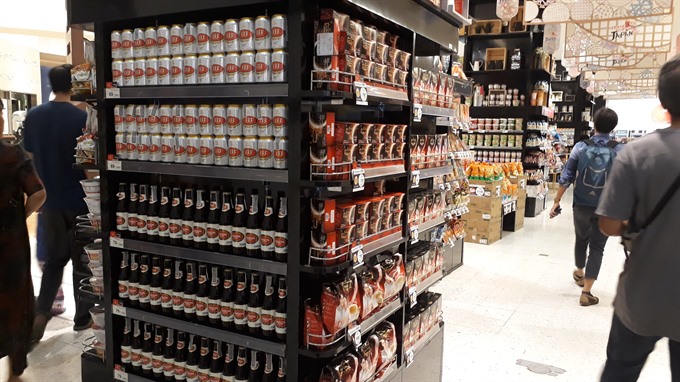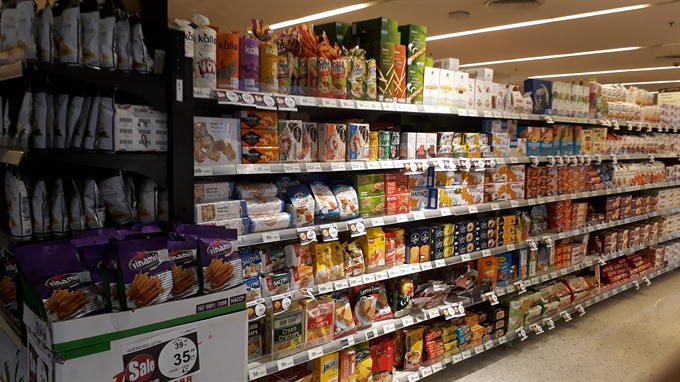 Economy
Economy

More and more Vietnamese companies are taking the initiative by showcasing their products overseas.
 |
| Vietnamese products on shelves of a Central Group’s supermarket in Bangkok. — VNS Photo Mai Hương |
By Mai Hương
HÀ NỘI – More and more Vietnamese companies are taking the initiative by showcasing their products overseas.
They hope by doing so, foreign-invested firms in Việt Nam would help them reach a wider audience, and improve sales.
About 60 Vietnamese enterprises took part in the “Vietnamese Goods and Tourism Week in Thailand” last month with 40 firms exhibited their goods while the other 20 attended the business matching session with Thai buyers under the Central Group.
Held by the Ministry of Industry and Trade and Central Group Vietnam, this is the third year the event has been held, and year on year, participation has grown. In 2016, just 20 companies took part. That figured double last year, and has grown to 60 at the latest event.
Another opportunity for them to met foreign distributors from Thailand, South Korea, Japan, mainland China, Hong Kong, and Malaysia was also organised in Thai Fest in June.
“This is a bridge putting customers, buyers and sellers together to discover the quality and products of Việt Nam,” said Philippe Broianigo, CEO of Central Group Vietnam and Big C Vietnam.
The ultimate target of these activities was to match products to buyers’ needs, Philippe said, adding that Việt Nam had many commodities yet to be exported and this was platform to show them off.
The business matching sessions provide good opportunities for local companies to study the market demand, consumers’ tastes, regulations and procedures, which they need to focus and make adjustments to be able to penetrate the foreign markets.
“We’re very happy that Vietnamese companies are no longer passive, only relying on the Government’s financial support or trade promotion programmes. They are being more proactive in connecting with potential buyers,” Đinh Thị Mỹ Loan, chairwoman of the Association of Việt Nam Retailers, told Việt Nam News.
Currently, most exports are through intermediaries. To increase the value of products, many Vietnamese firms are endeavoring to bring their goods into the foreign retail systems. This is also considered an efficient and sustainable export strategy.
The Vietnamese Government in 2015 set out the plan called “Promote Vietnamese enterprises to directly participate in foreign distribution networks up to 2020”.
After three years to implement, the project has seen some progress. More Vietnamese products have been displayed on shelves of big retail systems including Central Group, MM Mega Market, Lotte Mart, Aeon Mall, and some wholesale markets in the Europe and United States.
“Vietnamese goods have gradually built trust among foreign customers. Local products are now not only consumed in the home market but also can compete with foreign goods in the world,” Loan said.
It’s a long process
Goods worth about US$50-60 million were exported to Thailand through Central Group’s retail system last year. This number may seem small but according to Central Group Vietnam, it was encouraging because it allows time for the goods to be accepted by Thai consumers.
“We have regulations, even on packaging or translation. Many Vietnamese products have good quality but not good packaging, so we’re on a long process to make it sustainable,” Philippe said.
Nguyễn Long Hải, head of sales department of Long Triều Coffee Co, shared with Việt Nam News that this is the second time his company participated in the Vietnamese goods week in Thailand for second year. In the first year, it could not find any buyers as their products did not match Thai customers’ taste.
The company came back to this year’s event with many changes in classifying products and eye-catching designs with the hope of seeking Thai buyers, Hải said.
According to the Association of Việt Nam Retailers, ASEAN products share many similarities, so for Vietnamese goods to compete directly with products in their countries, it requires Vietnamese companies to constantly improve the quality, ensure stable supply, delivery time and competitive prices.
Good relationship
Exports can go through distribution systems where firms have close relationship, taking advantage of this relationship to expand their networks in foreign countries.
Today, foreign retail systems such as Central Group, AEON, Auchan and Lotte are cooperating with the Ministry of Industry and Trade in training courses for enterprises to give them an insight how to showcase their products to these networks.
Nguyễn Duy Liên, a representative of Vietnam Cacao Joint Stock Corporation, said Vietnamese companies are relying on recommendations of the business associations and foreign retailers, as well as State trade promotion activities to bring goods overseas.
He said Vietnamese products are now being exported at a small volume to Thailand and Central Group helped many local firms connect with a Thai distributor who will collect orders to shift goods to Thai together to save costs.
According to Vũ Kim Hạnh, chairwoman of the Association of High Quality Vietnamese Products Entrepreneurs and general director of the Center of Business Studies and Assistance, the biggest obstacle is that Vietnamese goods do not have standards.
“It’s like we are going out without passport. Big companies such as Vinamilk, Vinamit and Vĩnh Hoàn have a dozen of standards, but small companies do not know what standards are. Making standards is very expensive,” Hạnh said.
She also suggested companies re-do market research, focusing intensively on each sector or main markets instead of extensive studies. Companies and authorities may cooperate with market consulting firms like Kanta or McKinsey, as well as experts in universities to gain more effective research.
“The most important thing is to provide up-to-date market information, changes in policies in exporting markets, and teach them [companies] how to use information to increase export and minimise the probability of goods being returned,” Hạnh said. – VNS
 |
| Dried fruit of Vinamit in a supermarket in Central World in Bangkok, Thailand. — VNS Photo Mai Hương |




